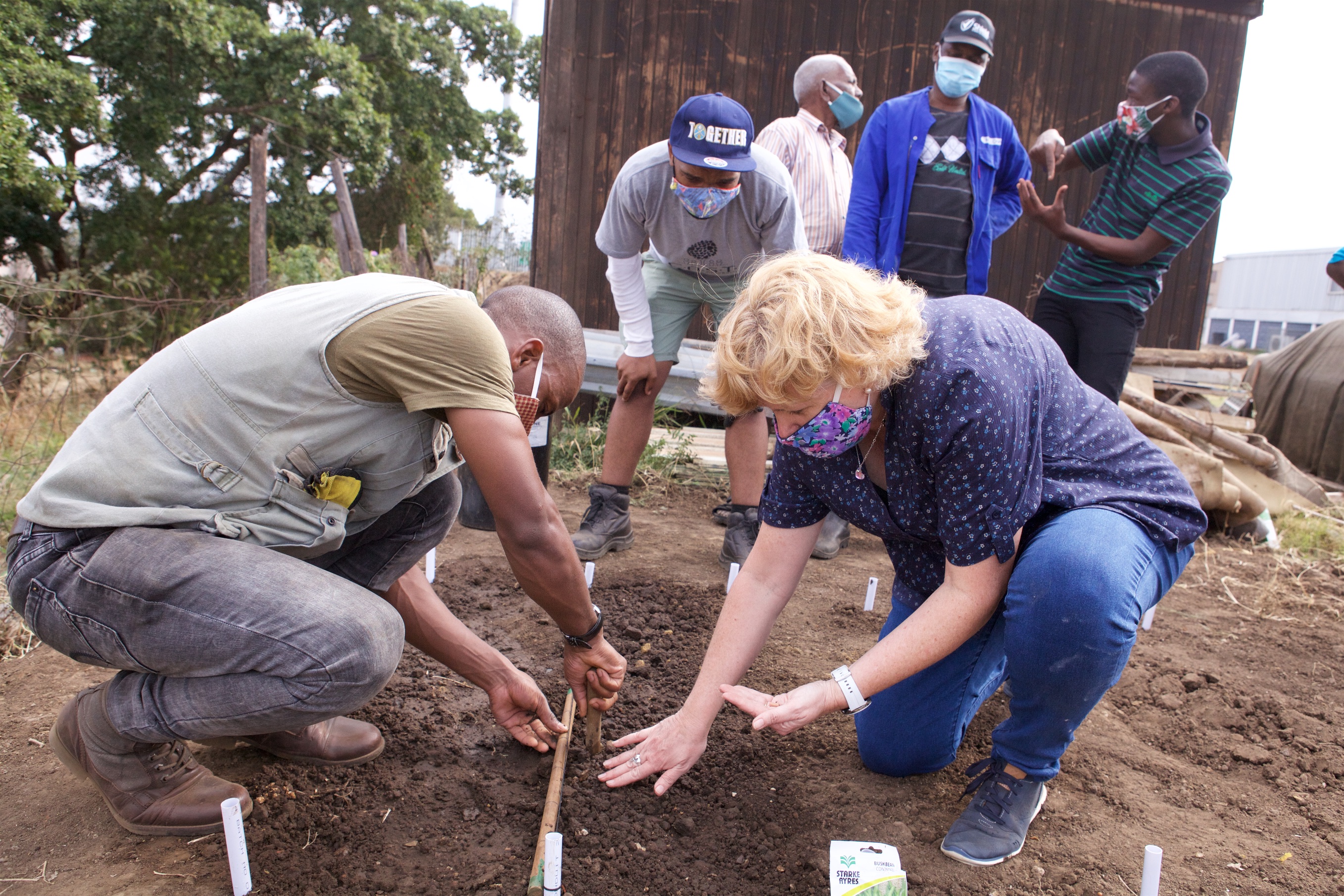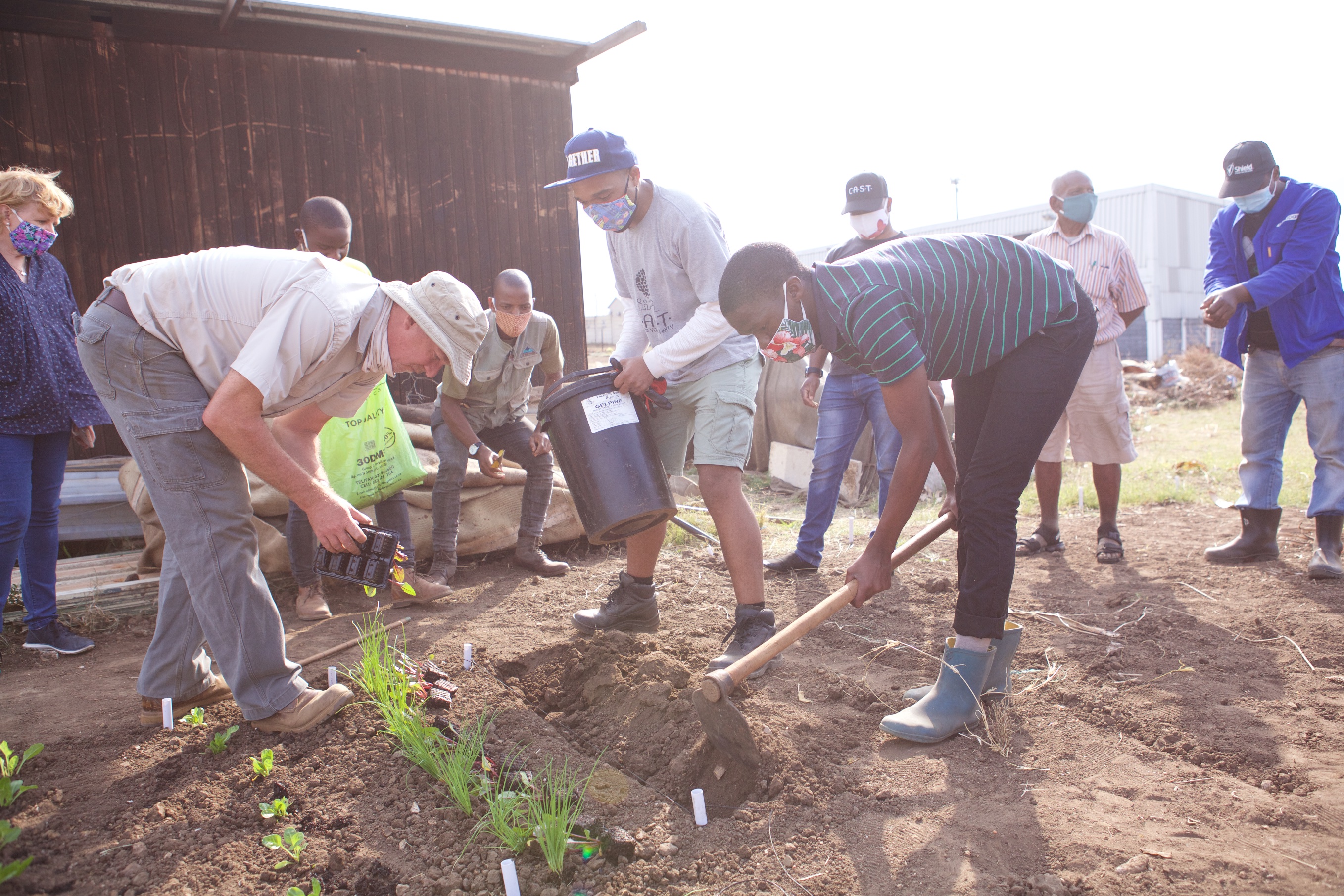If you spend yourselves on behalf of the hungry and satisfy the needs of the oppressed, then your light will rise in the darkness, and your night will become like the noonday.
Isaiah 58:10
For many of us growing up in middle class neighbourhoods, we have never personally experienced lack of access to food. We’ve never worried about where our next meal will come from. We cannot pretend to have any idea what it feels like to be food insecure.

But for millions of Africans, food insecurity, scarcity, and even starvation is an ever-present reality. Hunger is often ‘crouching at the door.’
South Africa is a relatively well-off country by African standards – in macro terms. But it is also one of the most – if not the most – disparate countries in the world. The wealth of the country is concentrated in the few, and the majority are economically vulnerable, often living on less than $3 per day.
Enter COVID-19. The estimate printed in this week’s newspaper is that 2.2 million people in South Africa have lost their jobs since the pandemic struck. Let that sink in for a moment.
The population of South Africa is 58 million. Before COVID, the South African work force was 16.3 million people. During this COVID period, 2.2 million people lost their jobs.
That’s more than 13% of the work force!

The food security problem in South Africa has long been masked by government social grants, and is now being alleviated by government COVID aid programs. The worry, of course, is that the economy may take many years to recover, and that the aid programs – and even the long-standing government grants – are unsustainable. Not to mention that the COVID aid programs are in the process of wrapping up.
Even now, we are hearing of many people going hungry who, before COVID, were getting by. Many churches and faith-based NGO’s are spending large amounts of money and energy putting together and distributing food parcels to the hungry. The need is most keenly felt by children who, due to government regulations, are going to school two days a week where they are fed breakfast and lunch. They often survive on one meal a day the other five days of the week.
We have been cautioning South Africans for years on the impacts of grants on livelihoods. When people can get by on other family members and government grants for food, there is often a lack of incentive and motivation to grow food. Furthermore, we have identified that with extremely poor results due to destructive gardening and farming practices, the motivation to continue to grow food shrinks even more. COVID has brought our concerns into reality. But in the midst of crisis, industry, innovation and initiative is returning to South Africa.
Since the gradual reduction of lockdown measures starting in July, the Inundo phone, email and text services have been pinging non-stop. We’ve had a steady stream of church and non-profit leaders come through the model farm to learn about the Farming God’s Way tool.
People are realizing that the only solution is for millions of South Africans to start growing their own food.

We are thrilled to be able to be a resource for the incredible leaders and visionaries who are wanting to impact their communities through food production. We also marvel at the fact that the Inundo Model Farm was established only 6 months before COVID emerged. The timing cannot be a coincidence.
In the midst of COVID we have witnessed homeless communities starting their own gardens. A carefully implemented strategy with intentional engagement from the Denis Hurley Centre attended to the homeless in the darkest days of the crisis. Tented camps that were set up as safe places for the homeless during COVID have become oases of hope due to the initiative of industrious groups. One particular group call themselves the Elangeni Green Team. On their own initiative, tent residents established a massive vegetable garden near the Jewish Club in Durban. Inundo has been able to come alongside the team and provide ongoing skill development in the form of accessing free resources for making compost, conditioning the soil with mulch and implementing crucial rotation strategies. Incredible resourcefulness has been uncovered in the midst of the COVID crisis and huge admiration goes toward staff of the Denis Hurley Centre for their tireless dedication to the Durban poor.

We have also witnessed the incredible courageous actions of local churches and NGO’s. A Pinetown church engaged personally with the homeless at the Pinetown tented camp. Strangers became friends and huge investment was made to develop gardening skills. Inundo hosted this group at the model farm and introduced them to Farming God’s Way methodology. When the tent camp was shut down, the church has continued to advocate for the municipality to allocate another unused property for the continuation of the work with these homeless groups. The church also maintains a flourishing demonstration and teaching garden in the midst of the bustling transportation district of Pinetown.
Another NGO network called CAST, stepped in immediately during COVID with a food relief strategy and now they are expanding their focus to food development strategies through training leaders in Phoenix, Kwadabeka, and Edendale. CAST worked with Inundo to present a virtual 3 day training which culminated in an outdoor practical Farming God’s Way training in Phoenix. Their attention to COVID protocols and the safety of their leaders was paramount while still being creative to get necessary skill development to where it was needed.









A followup training was initiated in Newcastle, KZN on 4 Saturdays in September by local Lutheran church leadership. They as well responded wisely and creatively to COVID challenges and were able to invest in people in a much needed time. Plus the continued investment of the team in Ntambahlophe, KZN resulted in local community members being able to weather COVID with the resources of their own gardens.
Inundo is working hard to equip leaders to become bringers of hope – agronomically, spiritually, socially, mentally and physically – to their communities. The problem of food insecurity is not a lack of resources. There are millions of hectares of unused arable land in South Africa, and a great many of those who are hungry and desperate have access to land!
What is needed is transformation of hearts and minds, and an understanding of how to steward resources well, resulting in provision for individuals, families and communities.
The momentum is building and the network of leaders we are privileged to be a part of is expanding. We will work hard to serve and resource this team with the hope of radical transformation in South Africa.


Im one of novice vegetable farmer undergoing training at Inundo Development . Since the Farming Gods Way program was introduced to me, I have observed changes in my way of thinking, understanding the need and importance to look after the soil, realising Gods gifts and abundance resources ar our disposal that we can use to produce food domestically without spending money but using knowledge of planting in Gods Way approach. Its interesting to be part of this growing program.
LikeLike